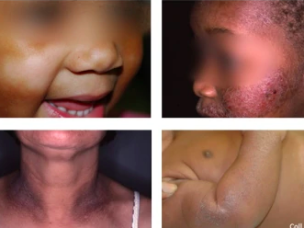Specialty
Continued Usage of Dupilumab Shows Atopic Dermatitis Treatment Results
Severe atopic dermatitis (AD) produces painful, itchy and unsightly patches that disrupt sleep and have been linked to increased risk of depression. Now researchers have analyzed findings from a randomized follow-up trial in adults from two previous studies (SOLO 1 and SOLO 2) and found that maintenance monotherapy with dupilumab (Dupixent, Regeneron) at 300 mg...
Mothers with Depression May Cause Atopic Dermatitis in Their Children
Atopic dermatitis (AD), a chronic, inflammatory skin disease that causes itchy, painful patches on patients has been linked to many mental health disorders, such as depression, anxiety, and suicidal tendencies. A study conducted by Jonathan Silverberg, MD, PhD, MPH, associate professor of dermatology at the George Washington University School of Medicine and Health Sciences, took...
Studies Show that Atopic Dermatitis is Harder to Treat in Black Patients
Eczema sufferers, also known as atopic dermatitis, can attest to how difficult is to identify a suitable treatment plan. This is especially troubling because symptoms include severe itching, scaly rashes, extremely dry skin and inflammation. This battle can be even more trying for Black people with the condition. A recent study published in Annals of...
New Drug Elicits Positive Reaction for Treatment of Poor-Prognosis non-Hodgkin Lymphoma (NHL)
Per recent study, patients with B-cell NHL (non-Hodgkins Lymphoma) who failed to respond to prior treatment therapies show positive results when given mosunetuzumab, a new investigational drug. This new drug targets two proteins, one on the surface of tumor cells and the other on the surface of the recipient’s T cells. The study has been...
Societal Factors Drive Higher Prostate Cancer Rates in Black Men, Study Shows
Black men are nearly 2.5 times more likely to be diagnosed with and die of prostate cancer compared to non-Hispanic white men. A new study aims to debunk the long-held belief that this is due to genetic factors. JAMA Oncology’s research team led by the U-M Rogel Cancer Center analyzed data from more than 300,000...
Different Factors Causes Diabetes in Black Patients
A new study has found that Type 2 diabetes in black patients is driven by a different mechanism than the the conventional concept of visceral fat deposition generating insulin resistance, as largely determined by research history in the white European population. The results imply that Black patients have a very different reason for developing Type...
New Developments in Cellular Therapy Bring Hope for Cancer Patients
Cellular immunotherapy is an innovative treatment approach that harnesses the body’s own immune system to fight cancer. These novel treatments are helping to transform the landscape for many current and future cancer patients. Preclinical studies provide the first evidence that cellular immunotherapy for B cell cancers could ultimately become an off-the-shelf product, capable of being...
New Dual-Targeted CAR T-Cell Therapy in Stubborn Multiple Myeloma Cases
More than three out of four patients with multiple myeloma that had unsuccessful therapy have been found to remain in remission more than seven months after treatment with a CAR T-cell therapy targeting two proteins that are frequently found on myeloma cells. Those experiencing sustained remissions include nine patients with a difficult-to-treat form of multiple...
Does MS Affect Minority Patients' Immune Systems Differently?
According to a study published in the July edition of the Neurology journal in 2007, multiple sclerosis affects the immune systems of African-Americans and whites differently. The study, pointed out that multiple sclerosis (MS) is not as prevalent but often more severe in Black people than in whites. The exact reason still hasn’t been identified,...
More Medical News














